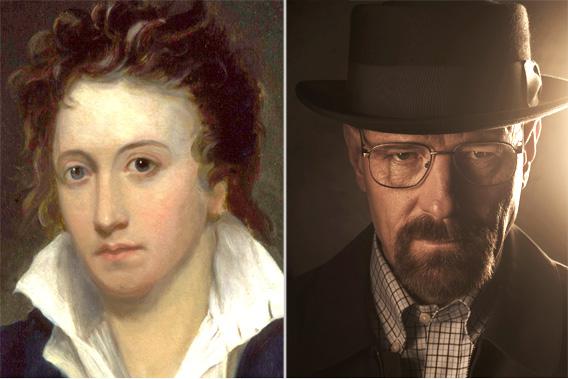The sonnet “Ozymandias,” by Percy Bysshe Shelley, rose again this week. A trailer for the final season of Breaking Bad featured Walter White reciting the poem, first published in 1818, while a time-collapsed reel of New Mexico landscape flashed by, as if some restless god from antiquity had put history on fast-forward.
Here at Brow Beat, Sharan Shetty made a case for why “Ozymandias” and Breaking Bad go together like ephedrine and red phosphorus: Both center on figures of passionate, monomaniacal ambition; both explore the (weirdly seductive, or at least commanding) nature of evil, especially as pitted against a more impersonal but equally violent power—time. As we prepared to put away our notes from high school English class, though, we had a “You’re Doing It Wrong: Shelley” moment. We’d always thought of “Ozymandias” as a textbook example of dramatic irony—the gulf in understanding between a character speaking lines and an audience hearing them. Were we mistaken?
The moral of “Ozymandias” seems simple. A great tyrant, otherwise known as Egyptian pharaoh Ramses II, has apparently commissioned a monument to his lofty works. The sculpted likeness, which bears his “wrinkled lip” and “sneer of cold command,” is inscribed with a boast: “My name is Ozymandias, King of Kings;/ Look on my Works, ye Mighty, and despair!” By the time we encounter the colossus, though, it has fallen into ruin. “Shattered” and “half sunk,” the “wreck” languishes in “lone and level sands.” Given Shelley’s anti-imperial leanings, the scornful takeaway seems obvious: So much for all that arrogant posturing. Joke’s on you, Oz! Can I call you Oz? Who cares! You’re just some rubble in the desert.
Except, according to the Romantic scholar Paul Fry, the poem is up to something far more complex than poking fun at a pharaoh’s empty dreams of immortality. Fry won’t deny that “Ozymandias” has an ironic soul, but he locates its mischief in an elaborate game Shelley is playing—on the reader.
Critics like to compare Shelley’s sonnet to one of those Chinese boxes that contain ever-smaller replicas of themselves. (I like to compare it to a Turducken.) The multiple voices, perspectives, and subjectivities nestled inside are similarly intricate and mind-boggling. At the “center” (is there a center? Paging Jacques Derrida …) floats the pharaoh, a transient human mystery whose meaning is interpreted and solidified by the sculptor who recreates him in stone. That relic, in turns, falls into the sights of “a traveler from an antique land”—a frantic-eyed adventurer who can’t even manage a polite hello before grabbing the poem’s speaker by the lapels. (“Two vast and trunkless legs of stone/ stand in the desert,” he intones, by way of greeting, perhaps gesticulating wildly. Nice to meet you, too.) Then there’s the speaker himself, a marvel of wary self-effacement. His “I” launches the poem and then vanishes, as if he could not shake off responsibility for the coming lines quickly enough. Cocooning all of these presences is the inscrutable consciousness of the poet; just outside hovers the mind of the reader.
Here is the joke, says Fry: Confronted by such a tapestry of unreliability, we think we have attained insight into Ozymandias. The sculptor was taken in too, when he tried to commit a version of his ruler to stone. But time warped his handiwork just as surely as it will reframe Shelley’s poem, muddle our recollections, and drag the leavings of our own lives through “lone and level sands.” (Are you laughing yet?) For Fry, in other words, “Ozymandias” links together a chain of egomaniacs who believe they have arrived at a stable form of knowing. It coaxes us into a glib understanding of its subject that it does not necessarily share—and the trench between that easy, seductive judgment and the truth (whatever it is) is the real irony.
Ramses II has not, actually, been forgotten. Nor was his ghost receding in Shelley’s time: The ancient Egyptians fascinated Napoleon, who brought archeologist-historians with him when he invaded Egypt in 1798, and Lord Byron, whose journals are littered with speculation about long-dead civilizations. (In fact, Byron’s adventures in Greece, Albania, and Turkey the year before the sonnet was written led Fry to wonder whether this “Napoleon of verse” was the “traveler from an antique land.”) And while the 18th-century “relic” poem—of which “Ozymandias” is an exemplar—has a memento mori, all-is-ephemeral vibe, sonnets traditionally celebrate the perseverance of art across centuries, even across the threshold separating life from death. So if Ozymandias and his sculptor were not right, they weren’t entirely wrong, either.
Sounds like the kind of uncertainty that might interest a guy nicknamed Heisenberg. Given how the last episode ended, I bet Walt likes Shelley better than (cryptic literary spoiler alert!) Whitman, at least.
